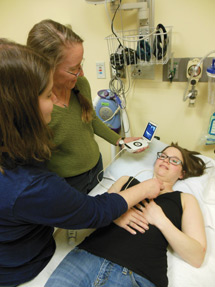Treat the epidemic of medical nonadherence
Multiple diseases and multiple medications can lead to some patients not following their medical regimens. Experts are examining why in an effort to help improve nonadherence rates that can reach 50% by some estimates.
If you think about medication from the patient's point of view, high rates of nonadherence to prescriptions (50% or more for chronic disease medications, by some estimates) shouldn't be surprising.
“Even I, as a physician, sometimes will not be adherent,” said Eric D. Peterson, MD, MPH, a cardiologist and professor of medicine at Duke University Medical Center in Durham, N.C. “I fight with my dentist all the time. Do I really need to floss?”

While flossing and pill-taking are both small daily annoyances, patients have several additional reasons to skip their prescribed medications.
“Every time you take a pill, you are reminded that you have something wrong with you. Number 2, those pills cost you money. Number 3, those pills may or may not have side effects associated with them, or at least you worry about that,” said Dr. Peterson.
Put it that way, and you can hardly blame patients for not taking their pills.
However, you can help them with adherence, according to experts. They offered ACP Internist some proven strategies for figuring out whether patients are adhering to their prescribed medications and, when they're not, helping them to do so.
Who's not taking their pills?
As Dr. Peterson noted, every patient is likely to be nonadherent at some point, meaning that the problem affects every medical practice. “If [physicians] think it's not a problem, they're probably just not in tune with their patients,” said Donna E. Sweet, MD, MACP, professor of medicine at the University of Kansas School of Medicine in Wichita.
That said, researchers have searched for ways to predict nonadherence. “A lot of research has been done looking at various risk factors for medication nonadherence, including demographic factors and disease condition factors and health system factors. Typically, what comes out is a mixed bag,” said Zachary A. Marcum, PharmD, MS, assistant professor in the Division of Geriatric Medicine at the University of Pittsburgh.
A few demographic factors have stuck out in multiple studies. “The literature suggests that overall the adherence rate to medications for the most part is much lower among black patients, among young patients, and among low-income patients,” said Gbenga Ogedegbe, MD, FACP, professor of medicine and population health at New York University School of Medicine in New York City.
A group of researchers at the University of North Carolina (UNC) recently investigated which patients were mostly likely to stop taking prescribed medications in the year after a heart attack. “The general adherence level across populations is low, but if we look at who has the highest risk, it's really the minority population, particularly black and Hispanic women,” said study author Gang Fang, PharmD, PhD, assistant professor in the Division of Pharmaceutical Outcomes and Policy at UNC in Chapel Hill.
Other factors can contribute, too, he added. “With multiple diseases, and you're taking multiple medications, it becomes really difficult,” Dr. Fang said.
The risk of nonadherence may be increased even further if those diseases don't cause symptoms when you miss a dose. “On the whole, asymptomatic conditions tend to be prone to medication nonadherence, things like hypertension,” said Dr. Marcum. “Patients don't feel bad when they don't take their meds, so it's out of sight, out of mind.”
While these risk factors have been identified in population-based research, the prevalence of nonadherence means they are not terribly effective for identifying an individual patient who is not taking medication.
Take the research finding that people without insurance are less likely to adhere, for example. “On average, they are less likely, but the majority of the people who don't take their medicines have insurance,” said Dr. Peterson. “There is no absolute to this.”
You have to ask
Since anyone could be nonadherent, the best way to find out whether a patient is taking medications is to ask, the experts agreed. This sounds obvious, but it doesn't happen routinely, even in practices that have procedures for medication reconciliation, according to Dr. Peterson.
“They say, ‘What are you prescribed?’ which is a different thing than ‘What are you routinely taking?’” he said. Follow-up questions like “Are there any ones you're having trouble taking?” can help uncover adherence issues, Dr. Peterson said.
Even patients whose nonadherence is causing medical consequences may not be directly asked about it. “Diabetes medicines, statins, all of those things—our first response when we see the medicine isn't having the desired effect is to increase or change the medicine as opposed to asking very specific questions: ‘I know it's hard to take all of your medicines. Do you think you got all of them in the past month?’” said Dr. Peterson.
Acknowledging that nonadherence is common can encourage patients to be honest about it, according to Dr. Ogedegbe. “[Ask] ‘In the past week, how many of the medications did you miss?’ You are making the patient think about the behavior, not in a guilty way, but as a fact of life,” he said.
In general, blame and guilt should be avoided during this conversation. “You want to ask the questions about their medications in a nonthreatening manner. Instead of saying ‘Are you taking your medicines, yes or no?’ we can say things like, ‘We know people have problems taking their medications. Do you have any problem with taking your blood pressure medication?’” Dr. Ogedegbe said.
If cognitive issues may be impeding patients' adherence, ask them to describe their medication routine. “If a patient can't tell [me] how they're taking their medicines, even if it's ‘I take a blue one in the morning and the evening and I take that round capsule at night’ ... that's my first warning signal that they're probably not taking them on a very regular basis,” said Dr. Sweet.
In general, knowing the potential reasons why a particular patient would fail to take medications may make it easier to screen him for nonadherence. Dr. Marcum and colleagues wrote an article categorizing the causes of nonadherence that was published in the May 22/29, 2013, Journal of the American Medical Association.
They divided patients' reasons into 6 categories: not understanding the relevance of medication to one's health and well-being, concluding the costs of taking medication outweigh benefits, finding medication management too complex to handle, being insufficiently vigilant, holding inaccurate or conflicting normative beliefs about medications, and not perceiving medication to have therapeutic efficacy.
The authors then assessed how well various screening tools for nonadherence would identify patients in the different categories. None of the screens caught all of the patient types, so clinicians will have to pick and choose, Dr. Marcum advised.
“If it is a site where cost is a really big issue, then you definitely want to make sure you're using an instrument that screens for cost-related nonadherence. If you're dealing with a population that might have some cognitive impairment, you want to be screening for things about forgetting to take your meds and making sure that you're also talking to caregivers,” he said.
Delegate
In addition to choosing a method of screening, medical practices have to decide who screens patients and when.
The answer is usually not the physician, experts said. “It's probably not a good idea to have the physician screening, because they are already focused on so many other things and pressed for time as it is,” said Dr. Marcum.
Dr. Ogedegbe agreed. “In a busy practice, the doctors or the nurses want to encourage the medical assistants to initiate discussions with the patients. Those are the people that spend the most time with the patient,” he said.
In addition to getting more time, nonphysicians may get more honest answers from patients. “One of the major barriers, at least in minority patients, is lack of trust of the medical establishment. Patients tend to overestimate how well they take their medicines because of social desirability,” said Dr. Ogedegbe.
To make the screen less social, and save additional time, questions about medication adherence can be asked before anyone has seen the patient, as part of previsit paperwork. “It could be done in the lobby as the patient's waiting. It could be mailed out in advance so that the patient comes ready,” said Dr. Marcum.
The clinician best positioned to uncover adherence issues may not be in your office at all. “When you're supposed to be taking 1 beta-blocker every day, and you had a 30-day supply and you filled it 45 days after the last time, the pharmacist has a very good idea that you're not particularly adherent,” said Dr. Sweet. “I have pharmacists who will call me and say, ‘Your patient hasn't picked up their antiretrovirals in the last 2 months. Is there a problem?’”
If electronic records are advanced enough, clinicians may not even have to rely on a helpful pharmacist. “With an integrated health care system, there may be ways for clinicians to look at when patients refill their medication,” said Michael Ho, MD, PhD, assistant professor of cardiology at the University of Colorado in Denver.
Finding a solution
Once a problem with adherence is identified, internists should definitely get involved in the effort to correct it. “The physician would likely be appropriate to address anything that comes up and try to brainstorm for solutions,” said Dr. Marcum. For example, if the cost of medication is the obstacle, a switch to a generic or on-formulary alternative may be the answer.
Researchers have done a lot of work on how to fix nonadherence—performing trials of various potential solutions—but the conclusions have been fairly general. “On the whole, the most effective interventions are typically multifaceted,” said Dr. Marcum. “It's a multifaceted intervention that combines education, knowledge, and some sort of behavioral intervention.”
Dr. Ogedegbe agreed. “Activate the patient in their own care. Be emotively supportive. Include patient education. Counsel the patient and motivate them,” he said. “A strategy that encompasses all of these approaches tends to be much more effective.”
That advice may sound nonspecific, but that's because the problem is, too. “There's probably not one solution that fits all. The reasons for nonadherence will vary between patients,” said Dr. Ho.
The solutions, then, should vary based on the reasons. “If [the reason] is ‘I don't like the medicines,’ then having some way to remember how to take the medicines isn't going to help you,” said Dr. Peterson.
Not remembering is a common problem, and one that technological innovators have targeted. There are smartphone apps (usually more popular with younger patients than older ones, experts noted) and even automatic medication dispensers.
New technologies can be helpful, but, again, they should be tailored to the patient, the experts said. “Some of these are very resource-intensive. If a patient can get along with just getting a pillbox, and that solves their problem, then that's the most appropriate intervention, rather than throwing the whole kitchen sink at them,” said Dr. Marcum.
In some cases, no tools may be needed at all to fix the problem. “[Use] cues in the time of day: ‘Every time I brush my teeth in the morning, I also take my medicines.’ Once that routine is set down, it's a lot easier for you to remember to take your medicines than if you're doing it at some odd hours, or if you have no cues,” said Dr. Peterson.
A conversation may be sufficient to resolve other reasons for nonadherence, too. “We don't go through and explain with each medicine: ‘This medicine will prevent you from having a subsequent heart attack’ ... If you said, ‘[The medication] can prevent you from coming back to the hospital and having that pain and losing part of your heart,’ I think most of them would probably adhere,” said Dr. Peterson.
Physicians who think that their patients already know this about their medications may be surprised. “We're assuming the patient actually holds the same beliefs as the health care provider. That is often not the case. There's tons of data showing that patients' beliefs about medication are different from the providers' beliefs about medication,” said Dr. Ogedegbe.
Changing beliefs can be difficult, but hard evidence of how medications work may help. Home monitoring of blood pressure or blood glucose provides this. “They're seeing directly: ‘I didn't take my blood pressure medication this morning, and I take my blood pressure this afternoon and it's off the charts,’” said Dr. Peterson.
Once convinced of the effectiveness of medication, patients may benefit from some contemplation of the bigger picture, too. The National Consumers League runs a patient-focused adherence program called Script Your Future and as part of that has surveyed patients about their thoughts on medication. They found that the impact on others was sometimes more compelling than effects on the patients themselves.
“If they're sick because they're not taking their medication as directed, they can't help take care of their family. They can't be there for those special moments. That was a very powerful theme,” said Rebecca Burkholder, JD, vice president of health policy for the National Consumers League.
Script Your Future offers a number of resources on its website to help both patients and physicians with improving adherence, from worksheets (including ACP's Health TiPS, also available online) to educational videos about medications.
These tools may help physicians and patients as they struggle with what is sure to be an ongoing issue in medical practice. Dr. Peterson pointed out that physicians should be alert to changing reasons for nonadherence. “You could start with a patient who really doesn't understand why they're on their medicines, and you convince the patient. They could evolve into, ‘I get that I'm supposed to, but I forget all the time.’ Then you might help the patient with pillboxes or electronic reminders or other cues. Then, ‘I changed drug plans, and the cost of the medicine doubled or tripled,’” he said.
Dr. Marcum agreed. “It's dynamic, changes over time within the same patient across medications,” he said. “It's really kind of a moving target.”




